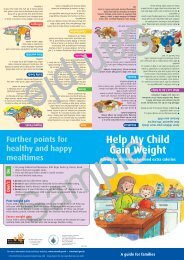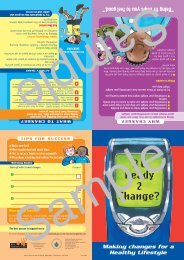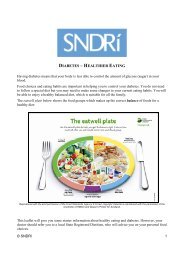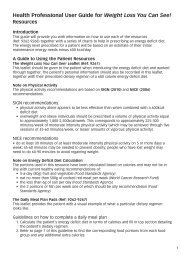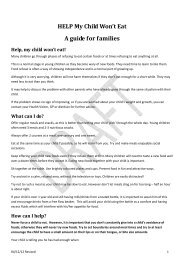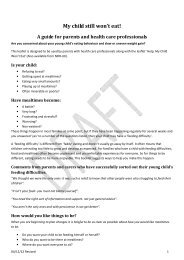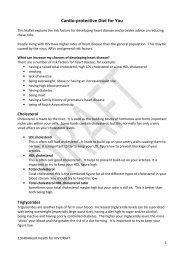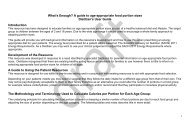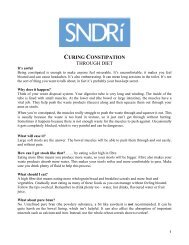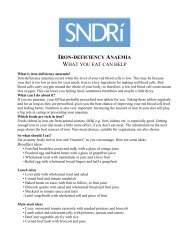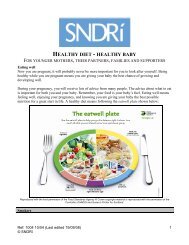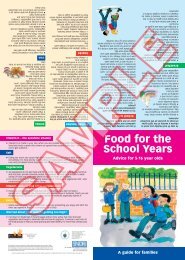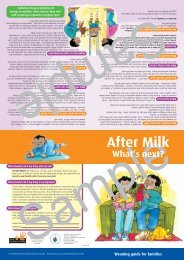9225Introduction to CHOCounting.pdf - NDR-UK
9225Introduction to CHOCounting.pdf - NDR-UK
9225Introduction to CHOCounting.pdf - NDR-UK
Create successful ePaper yourself
Turn your PDF publications into a flip-book with our unique Google optimized e-Paper software.
Intensive Insulin Therapy and Your Treatment Plan<br />
Your treatment plan uses intensive insulin thera p y. This allows you <strong>to</strong> take your insulin in a<br />
way that mimics the normal secretion of insulin from the pancreas. You do this by having one<br />
or two injections of basal (background or long-acting) insulin a day and injections of bolus<br />
( rapid-acting) insulin with foods that contain carbohydra t e.<br />
Using this treatment plan with carbohydrate counting will help you <strong>to</strong> keep your blood glucose<br />
as close <strong>to</strong> normal as possible. You will adjust your insulin <strong>to</strong> b a l a n c e with the carbohydrate in<br />
your meals and snacks, helping you <strong>to</strong> manage everyday life including activity, s p o r t s, s c h o o l ,<br />
stress and illness.<br />
B a s a l<br />
B a s a l means b a c k g r o u n d or l o n g - a c t i n g i n s u l i n . Your body always needs basal insulin <strong>to</strong><br />
keep your blood glucose levels steady and <strong>to</strong> give you energy.<br />
Your basal insulin is<br />
Basal and Bolus Insulin Effect<br />
Insulin Effect<br />
Basal<br />
Bolus<br />
Basal<br />
Bolus<br />
Bolus<br />
Bolus<br />
Time<br />
B o l u s<br />
B o l u s insulin is r a p i d - acting insulin that your body needs when you eat carbohydra t e.<br />
You will take your bolus with meals, and sometimes with snacks. This type of insulin helps<br />
your body deal with the glucose it gets from the carbohydrate in your food.<br />
Your bolus insulin is<br />
Do I need <strong>to</strong> count carbohydrate <strong>to</strong> follow my treatment plan?<br />
C a r b o h y d rate counting will help you <strong>to</strong> get all the benefits from your treatment plan. You will<br />
work out how much carbohydrate is in your meals and snacks then adjust your bolus <strong>to</strong> keep<br />
your blood glucose within your target ra n g e.<br />
It is still important <strong>to</strong> have a healthy diet, but carbohydrate counting gives you more choice of<br />
w h a t , when and how much you can eat. This will help you <strong>to</strong> worry less about eating <strong>to</strong> avoid<br />
h y p o s, or snacking when you are not hungry.<br />
C a r b o h y d rate counting is much more than being able <strong>to</strong> estimate the carbohydrate content of<br />
f o o d s. It is also about learning how <strong>to</strong> adjust your bolus insulin <strong>to</strong> the food you eat and the<br />
activities you enjoy.<br />
Your diabetes team will help and support you <strong>to</strong> count carbohydrate and adjust your insulin.<br />
Your confidence will grow with practice and soon you will realise that you control your<br />
d i a b e t e s !<br />
00 2



